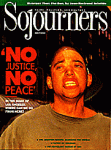The LAPD is a favorite subject of West Coast rap lyricists. The department's notoriety, of course, is just that - notorious. The homeboys perceive the cops as the most dangerous gang in the City of Angels.
What with the rebellion that followed the acquittal of four of the most notable of the notorious, it seems like a good idea to see how the purveyors of pop culture handle the unrest.
With a broom and not a gun
Rush Limbaugh, probably the biggest wave-maker on talk radio, offered early commentary on the crisis. Actually he was uncharacteristically restrained the first day, allowing his listeners to offer inane analysis and outrageous comments. He simply did the radio equivalent of nodding his head as callers babbled on about such things as how Rodney King had lured the officers into beating him for a financial settlement or a movie contract.
By the following day, however, Rush had determined he could get away with his own inanity. Limbaugh said that the events in LA were not political but cultural. Code words at their best.
Limbaugh wanted to say that it's in the genes, ya' know; that these people don't know any better. Good Society policies, added to intolerable personal habits, lead to such a society, he posits. And, he fears, America will play right into "their" hands by beginning to deal with the long-neglected urban problems.
I don't think Limbaugh has the same "worry" about the Keating crew. And that's probably true for most of us. America has never had a good visual image to tie to the Savings and Loan scandal. The big rip-off just wasn't made for TV. But the looting of buildings in LA was. No longer does it matter what the copy is; the images tell the story.
The image portrayed by Hollywood and New York will go a long way toward defining this event. According to The Washington Post, there are not yet plans for a made-for-TV movie, but several quickie books are being rushed through the publication process. And it was striking to hear (and see the video of) a Tom Petty tune on the airwaves, in response to the events, within 48 hours of the verdict and the rebellion.
Many of us grouse with some regularity about the fact that our culture has replaced "the hero" with "the celebrity"; in other words, fame is valued and respected more than behavior. With a lack of inspiring and trustworthy political, religious, and community leaders, we, especially young people, look to the rising wealthy of sports and films.
But it is heartening to see that in at least one case celebrity-status may overlap with honest-to-goodness heroism. James Edward Olmos, star and director of the recently released American Me and formerly the cool squad leader of television's Miami Vice, was early on the streets decrying the verdict, calling for calm, and announcing his intention to take back the neighborhood not with a gun, but with a broom. Many credit his call for rebuilding as the source of the remarkable day-after turnout.
Still, class issues leave many of the entertainers who became involved - Arsenio Hall, Blair Underwood, Jimmy Smits - in an awkward position: Though they carry serious weight in the communities, their lifestyles cause their daily attention to be directed elsewhere. We can only view their activities with a sense of ambivalence - since the portrait of "the made life" these entertainers hold out before the disenfranchised is often further alienating.
But Olmos did something a little different. He didn't try to lead by public service announcement; he led by getting into the streets. He reacted by jumping in, not by waiting for the right circumstances to present themselves. Now there's someone worth following.
Bob Holteen was the Under Review editor for Sojourners when this article appeared.

Got something to say about what you're reading? We value your feedback!
